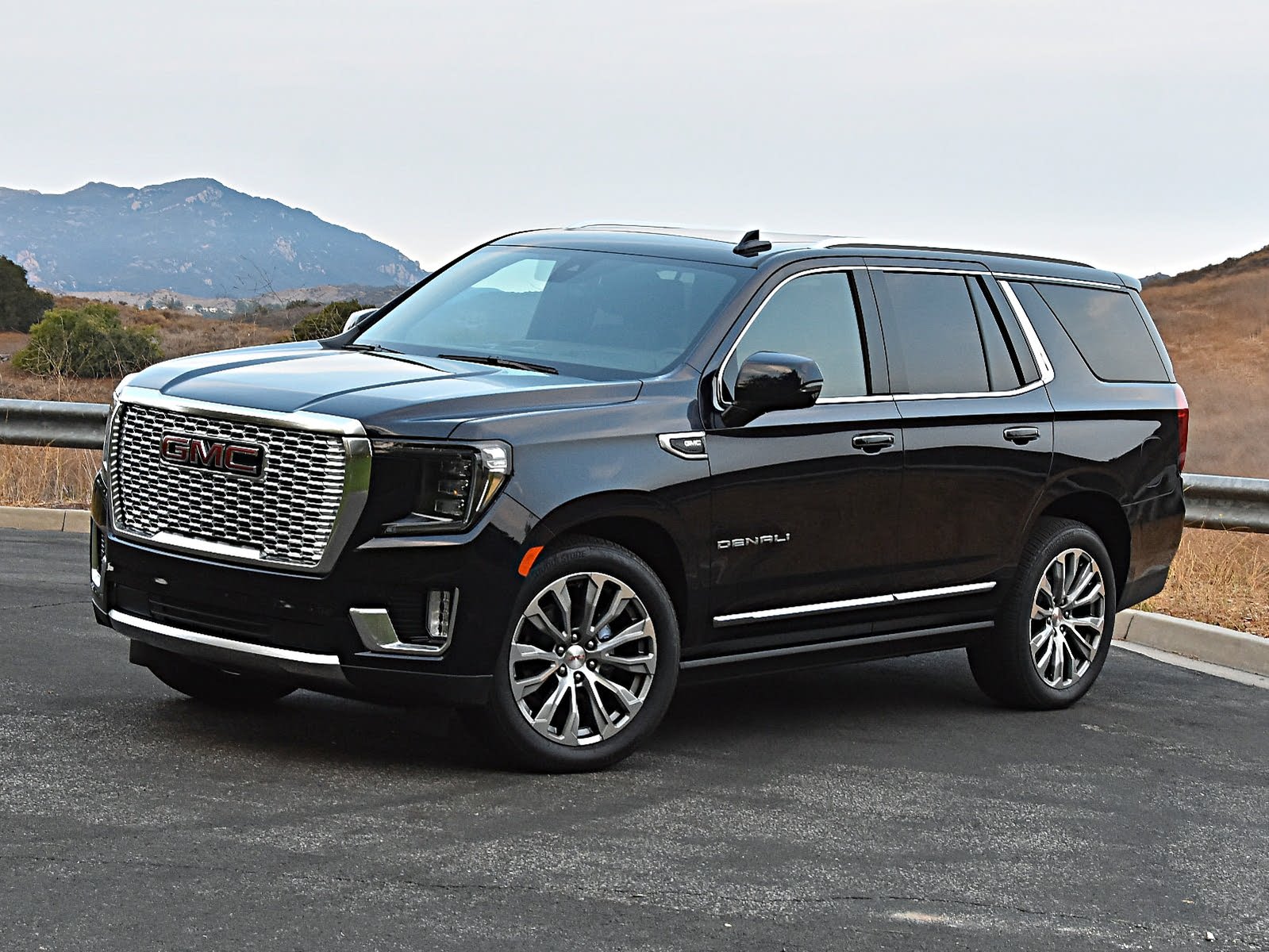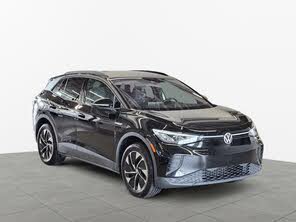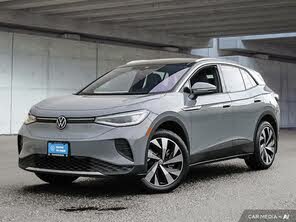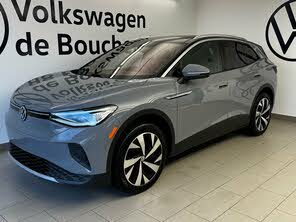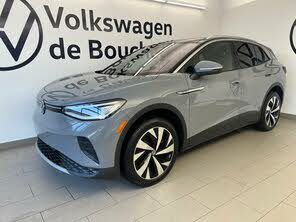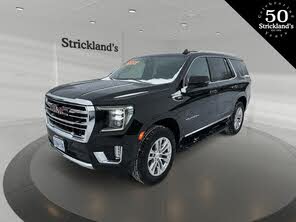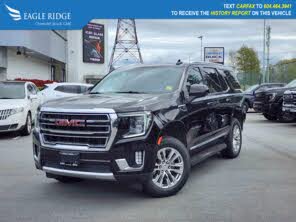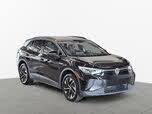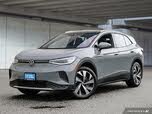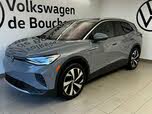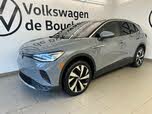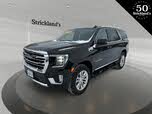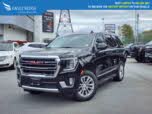2022 Volkswagen ID.4 vs 2021 GMC Yukon
Overview | |
MSRP$51,000 | MSRP$41,230 |
Average price$65,547 | Average price$39,170 |
Listings27 | Listings7 |
Ratings & Reviews | |
User Reviews | User Reviews |
Expert reviews7.7 out of 10 | Expert reviews |
2021 GMC Yukon Reviews SummaryWith the redesigned 2021 GMC Yukon, several good things happen. First, GMC improves passenger space and cargo space by stretching the wheelbase and switching to an independent rear suspension design. Second, those same changes, coupled with a new air-ride adaptive suspension option, enhance the full-size SUV’s ride and handling. Third, payload ratings rise by as much as 45 kilograms (100 pounds). Fourth, the Yukon gets a significant technology upgrade. But at the same time, the new Yukon takes a couple of steps backward. Tow ratings can’t match the outgoing Yukon, and in some cases, fuel efficiency numbers worsen rather than improve. Still, all things considered, the Yukon's updates for the 2021 model year represent advancement. | |
2022 Volkswagen ID.4 Reviews Summary | |
No video found | No video found |
Popular Features & Specs | |
Engine5.3L 355 hp V8 | Engine201 hp Electric |
Drive Train4X2 | Drive TrainRWD |
Seating Capacity9 | Seating Capacity5 |
Horsepower355 hp @ 5600 rpm | Horsepower |
EV Battery Capacity | EV Battery Capacity82 kWh |
MPG City15 | MPG City116 |
MPG Highway20 | MPG Highway98 |
Battery Charge Time (240V) | Battery Charge Time (240V)7.5 hours |
Engine | |
Engine Name5.3L 355 hp V8 | Engine Name201 hp Electric |
Torque383 lb-ft @ 4100 rpm | Torque |
Horsepower355 hp @ 5600 rpm | Horsepower |
Battery Charge Time (240V) | Battery Charge Time (240V)7.5 hours |
Drivetrain4X2 | DrivetrainRWD |
Fuel Economy | |
EV Battery Capacity | EV Battery Capacity82 kWh |
MPG City15 | MPG City116 |
MPG Highway20 | MPG Highway98 |
Interior | |
Seating Capacity9 | Seating Capacity5 |
Key Features | |
Navigation System | Navigation SystemOptional |
Safety | |
Front Crash Overall4 | Front Crash Overall5 |
Side Crash Overall5 | Side Crash Overall5 |
Dimensions & Capacity | |
Cargo Space25.5 cu ft | Cargo Space30.3 cu ft |
Curb Weight5490 lbs | Curb Weight4568 lbs |
Height76.5 in | Height64.6 in |
Length210.0 in | Length180.5 in |
Width81.0 in | Width72.9 in |
Wheelbase120.9 in | Wheelbase108.9 in |
Maximum Payload1792 lbs | Maximum Payload937 lbs |
Number of doors4 | Number of doors4 |
Maximum Towing Capacity8400 lbs | Maximum Towing Capacity2200 lbs |
Standard Towing Capacity7900 lbs | Standard Towing Capacity2200 lbs |
Overview | ||
MSRP | $51,000 | $41,230 |
Average price | $65,547 | $39,170 |
Listings | ||
Ratings & Reviews | ||
User reviews | ||
Expert reviews | 7.7 out of 10Read full review | |
Pros & cons | ||
Summary | With the redesigned 2021 GMC Yukon, several good things happen. First, GMC improves passenger space and cargo space by stretching the wheelbase and switching to an independent rear suspension design. Second, those same changes, coupled with a new air-ride adaptive suspension option, enhance the full-size SUV’s ride and handling. Third, payload ratings rise by as much as 45 kilograms (100 pounds). Fourth, the Yukon gets a significant technology upgrade. But at the same time, the new Yukon takes a couple of steps backward. Tow ratings can’t match the outgoing Yukon, and in some cases, fuel efficiency numbers worsen rather than improve. Still, all things considered, the Yukon's updates for the 2021 model year represent advancement. | |
Video | No video found | No video found |
Popular Features & Specs | ||
Engine | 5.3L 355 hp V8 | 201 hp Electric |
Drive Train | 4X2 | RWD |
Seating Capacity | 9 | 5 |
Horsepower | 355 hp @ 5600 rpm | |
EV Battery Capacity | 82 kWh | |
MPG City | 15 | 116 |
MPG Highway | 20 | 98 |
Battery Charge Time (240V) | 7.5 hours | |
Engine | ||
Engine Name | 5.3L 355 hp V8 | 201 hp Electric |
Torque | 383 lb-ft @ 4100 rpm | |
Horsepower | 355 hp @ 5600 rpm | |
Battery Charge Time (240V) | 7.5 hours | |
Drivetrain | 4X2 | RWD |
Fuel Economy | ||
EV Battery Capacity | 82 kWh | |
MPG City | 15 | 116 |
MPG Highway | 20 | 98 |
Interior | ||
Seating Capacity | 9 | 5 |
Key Features | ||
Navigation System | Optional | |
Safety | ||
Front Crash Overall | 4 | 5 |
Side Crash Overall | 5 | 5 |
Dimensions & Capacity | ||
Cargo Space | 25.5 cu ft | 30.3 cu ft |
Curb Weight | 5490 lbs | 4568 lbs |
Height | 76.5 in | 64.6 in |
Length | 210.0 in | 180.5 in |
Width | 81.0 in | 72.9 in |
Wheelbase | 120.9 in | 108.9 in |
Maximum Payload | 1792 lbs | 937 lbs |
Number of doors | 4 | 4 |
Maximum Towing Capacity | 8400 lbs | 2200 lbs |
Standard Towing Capacity | 7900 lbs | 2200 lbs |

By: CarGurus + AI
At CarGurus, our team of experienced automotive writers remain at the heart of our content operation, conducting hands-on car tests and writing insightful guides that are backed by years of industry experience. To complement this, we are harnessing AI to make our content offering more diverse and more helpful to shoppers than ever. To achieve this, our AI systems are based exclusively on CarGurus content, ratings and data, so that what we produce is both unique to CarGurus, and uniquely helpful to car shoppers.
Popular vehicle comparisons
2020 Volvo XC90 vs 2021 GMC Yukon2021 Lincoln Navigator vs 2022 Volkswagen ID.42020 Lexus GX vs 2021 GMC Yukon2020 Chrysler Pacifica vs 2021 GMC Yukon2020 Buick Enclave vs 2021 GMC Yukon2021 Jeep Wrangler 4xe vs 2022 Volkswagen ID.42021 Volkswagen ID.4 vs 2022 Volkswagen ID.42021 Lexus GX vs 2022 Volkswagen ID.42020 Dodge Grand Caravan vs 2021 GMC Yukon2021 Chrysler Pacifica vs 2022 Volkswagen ID.42020 Honda CR-V vs 2021 GMC Yukon2020 Volkswagen Tiguan vs 2021 GMC Yukon2020 Chrysler Pacifica Hybrid vs 2021 GMC Yukon2021 Lexus NX vs 2022 Volkswagen ID.42021 Buick Enclave vs 2022 Volkswagen ID.42021 Volvo XC90 vs 2022 Volkswagen ID.42020 Buick Encore vs 2021 GMC Yukon2020 Toyota Sienna vs 2021 GMC Yukon2021 Honda Odyssey vs 2022 Volkswagen ID.42021 Ford Bronco Sport vs 2022 Volkswagen ID.42021 Honda CR-V vs 2022 Volkswagen ID.42021 Lincoln Aviator vs 2022 Volkswagen ID.42020 Nissan Rogue vs 2021 GMC Yukon2020 Volvo XC40 vs 2021 GMC Yukon
2023 Ford Bronco Sport vs 2023 Volkswagen ID.42023 Lincoln Navigator vs 2023 Volkswagen ID.42023 Jeep Wrangler 4xe vs 2023 Volkswagen ID.42023 Volkswagen ID.4 vs 2023 Chrysler Pacifica Hybrid2023 Volvo XC90 vs 2023 Volkswagen ID.42023 Honda Odyssey vs 2023 Volkswagen ID.42023 Volkswagen ID.4 vs 2023 Lexus NX2023 Lexus GX vs 2023 Volkswagen ID.42023 Volvo XC40 vs 2023 Volkswagen ID.42023 Jeep Grand Cherokee L vs 2023 Volkswagen ID.42023 Nissan Rogue vs 2023 Volkswagen ID.42023 Volkswagen ID.4 vs 2023 Chrysler Pacifica2023 Buick Enclave vs 2023 Volkswagen ID.42023 Volkswagen ID.4 vs 2023 Lexus RX Hybrid2023 Toyota Sienna vs 2023 Volkswagen ID.42022 MINI Countryman vs 2023 GMC Yukon2022 Volvo XC40 vs 2022 GMC Yukon2022 Volvo XC40 vs 2023 GMC Yukon2022 Volkswagen Tiguan vs 2023 GMC Yukon2022 Buick Enclave vs 2023 Volkswagen ID.42022 Volvo XC90 vs 2022 GMC Yukon2022 Mitsubishi Outlander Sport vs 2023 Volkswagen ID.42022 Lexus NX vs 2023 Volkswagen ID.42022 Acura MDX vs 2022 GMC Yukon2022 Nissan Rogue vs 2023 Volkswagen ID.42022 Jeep Wrangler 4xe vs 2023 Volkswagen ID.42022 Acura MDX vs 2023 GMC Yukon2022 Honda CR-V vs 2023 Volkswagen ID.42022 Lexus GX vs 2022 GMC Yukon2022 Lincoln Aviator vs 2023 Volkswagen ID.42021 Volkswagen ID.4 vs 2022 Honda CR-V2021 Nissan Rogue vs 2022 GMC Yukon2021 Buick Enclave vs 2022 GMC Yukon2021 Volkswagen ID.4 vs 2022 Lexus NX2021 Volvo XC90 vs 2022 GMC Yukon2021 Volkswagen ID.4 vs 2022 Lincoln Aviator2021 MINI Countryman vs 2022 GMC Yukon2021 Volkswagen ID.4 vs 2022 MINI Countryman2021 Volkswagen ID.4 vs 2022 Chrysler Pacifica2021 Volkswagen ID.4 vs 2022 Volvo XC402021 Chrysler Pacifica Hybrid vs 2022 GMC Yukon2021 Lincoln Aviator vs 2022 GMC Yukon2021 Volkswagen ID.4 vs 2022 Lincoln Navigator2021 Volkswagen ID.4 vs 2022 Volvo XC902020 GMC Yukon vs 2021 Mitsubishi Outlander Sport2020 GMC Yukon vs 2021 MINI Countryman2020 GMC Yukon vs 2021 Chrysler Pacifica Hybrid2020 Volvo XC40 vs 2021 Volkswagen ID.42020 Lincoln Aviator vs 2021 Volkswagen ID.42020 Lexus NX vs 2021 Volkswagen ID.42020 GMC Yukon vs 2021 Toyota Sienna2020 GMC Yukon vs 2021 Honda CR-V2020 GMC Yukon vs 2021 Buick Encore2020 GMC Yukon vs 2021 Honda Odyssey2020 Lincoln Navigator vs 2021 Volkswagen ID.42020 MINI Countryman vs 2021 Volkswagen ID.42020 GMC Yukon vs 2021 Lincoln Navigator2020 GMC Yukon vs 2021 Nissan Rogue2019 Mitsubishi Outlander Sport vs 2020 GMC Yukon2019 Chrysler Pacifica vs 2020 GMC Yukon2019 Volvo XC40 vs 2020 GMC Yukon2019 Toyota Sienna vs 2020 GMC Yukon2019 Lincoln Navigator vs 2020 GMC Yukon2019 Volvo XC40 vs 2019 GMC Yukon2019 Volvo XC90 vs 2019 GMC Yukon2019 MINI Countryman vs 2020 GMC Yukon2019 Buick Encore vs 2019 GMC Yukon2019 Nissan Rogue vs 2020 GMC Yukon2019 Lexus NX vs 2020 GMC Yukon2019 MINI Countryman vs 2019 GMC Yukon2019 Honda Odyssey vs 2020 GMC Yukon2019 GMC Yukon vs 2019 Volkswagen Tiguan
